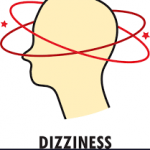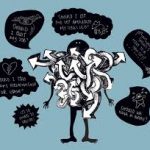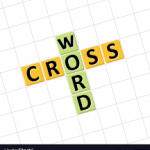Although every case of Parkinson’s is said to be different, there are some general symptomatic states which occur quite commonly. They include dizziness and mild cognitive impairment. This piece will help those affected, either directly or through a friend or relation, to understand the nature of these two symptoms.
Finding the right word
My own written record shows that I have been complaining for at least three years about my inability to make clear to clinicians and friends the nature of one of the main ‘states of upset’ I have been experiencing.
In November 2016, in the record of an appointment with one of my attending health professionals, I wrote:
I asserted that the matter responsible for the majority of the debilitation I have is what I call my 'undiagnosed condition'. It consists of light-headedness, impaired vision and the need to bend forward and gaze at my knees after even the slightest exercise - but not all the time, just now and then.
I frequently referred uncertainly to the condition as ‘dizziness’ with no confidence that the word connotes the reality. A report I wrote on 23 March 2017 for my neurologist included this:
Since mid-January my symptoms have been those normally associated with low blood pressure (BP): dizziness, blurred vision, light-headedness. My normal BP is c.140/80. Several times it has been in the range 90-110/60-70 (seated) and 60-70/45-55 (standing). The severity of the low BP symptoms varies from time to time and from day-to-day. When the symptoms are more serious, simple acts like walking a few paces, standing at the sink, or hanging a wash on the line become difficult.
Imagine my relief and delight, then, at discovering a webinar online in which one of the expert presenters deals specifically with the issue of Parkinson’s and the dizzy patient. It was held in the lead-up to the World Parkinson’s Congress (WPC), 4-7 June 2019, Kyoto, Japan.
To view the pre-Congress webinars, use the link below. You will need to register but there is no cost.
- Webinar 1: Non-motor complications and treatment
- Webinar 2: Surgical advances and infusions
- Webinar 3: Motor complications and treatment
|
Professor Tim Anderson is one of the speakers in Webinar 1. He holds the Cas Van Der Veer Chair in Parkinson’s and Movement Disorders at the University of Otago, Christchurch, New Zealand.
My thanks to Professor Anderson for expanding for me on a couple of points in his presentation.
The non-motor symptoms of Parkinson’s are less obvious or visible than motor symptoms such as tremor, troubled gait and freezing. They include symptoms resulting from changes to the autonomic nervous system and psychological complications. The autonomic nervous system controls things such as blood pressure, sweating, and the function of bowels and bladder.
The dizzy patient

Dizziness can of course occur in people who do not have Parkinson’s and on its own and with no other symptoms it does not indicate Parkinson’s. And when it is experienced by people who do have Parkinson’s it may be caused by other conditions such as problems with the inner ear, anaemia or low blood sugar.
But it is clear to me from the details given by Tim Anderson that my particular dizziness is caused by Parkinson’s. He reports on the sort of exchange he has had with some of his Parkinson’s patients, which rings true with me:
Patient: I feel dizzy. Clinician: What do you mean by dizzy? Patient: Well I just don't feel right. Clinician: Can you describe it? Patient: No I can't really describe it; I just don't feel well.
About half of people with Parkinson’s report some kind of dizziness. For them it is most commonly caused by low blood pressure on standing (symptomatic orthostatic hypotension). When the systolic blood pressure (the first number) falls by 20mm or more of mercury, and/or the diastolic falls by 10mm or more, it is defined as neurogenic orthostatic hypotension. ‘Neurogenic’ means that BP falls on standing and the pulse rate does not increase by at least 15 beats a minute when one stands up. It indicates that blood flow to peripheral areas is affected; the noradrenaline system is deficient.

Another type of dizziness in Parkinson’s is post-prandial hypotension, caused by pooling of blood in the gut circulation causing dizziness within an hour or so of eating.
Tim Anderson provides a number of tips to help people manage the condition. They need to consider the possibility that one of the medications they are taking may be implicated. They should have extra salt and water, and avoid alcohol, caffeine and sugary drinks during the day, and avoid high carbohydrate meals before bedtime.
Exercise is important and for people with orthostatic hypotension exercise done in a seated or supine position may be best: swimming, rowing or cycling. Some relief can be obtained by doing muscle exercises when standing: clenching the buttocks, crossing the legs and standing on tiptoe.
The amount of blood pooling in the lower extremities or abdomen can be reduced by the use of stockings or abdominal binders. And it may be useful to raise the head of the bed up so that there’s pooling in the legs when the person lies down at night.
Mild Cognitive Impairment (MCI)
Another cluster of non-motor symptoms experienced by people with Parkinson’s is given the name Mild Cognitive Impairment (MCI). The general case sees patients becoming aware that they are not thinking clearly, they are becoming forgetful and struggling to be decisive. People close to the patient may note that they have lost confidence and seem unable or unwilling to make decisions about family matters. They don’t want to socialise as much as before, and find conversations in large groups of friends difficult.

Having observed such issues as these, the Parkinson’s specialist is likely to dig a little deeper and administer some cognitive assessment tests to establish whether the subject has MCI. A diagnosis of MCI does not necessarily mean that the person will later develop dementia. In fact in some cases later tests may indicate that normal cognition has returned.
If they do have MCI the affected person should do everything in their power to combat it. Exercise is the most important thing – physical activity every day. They should choose exercise they enjoy because that’s the one they’ll stick with.
The same applies to brainteasers. To date it has been difficult to prove scientifically that doing brain exercises (sudoku, crosswords) is efficacious in improving wider cognition in someone with Parkinson’s. But it can be said with confidence that a key to the maintenance of cognitive function is to do as much reading and learning as you can – in particular, challenging the mind to learn new things.
It is also certain that keeping up social contacts and social activity of all kinds is vitally important to preserving general cognitive ability.
So I’ll be round to see you.



